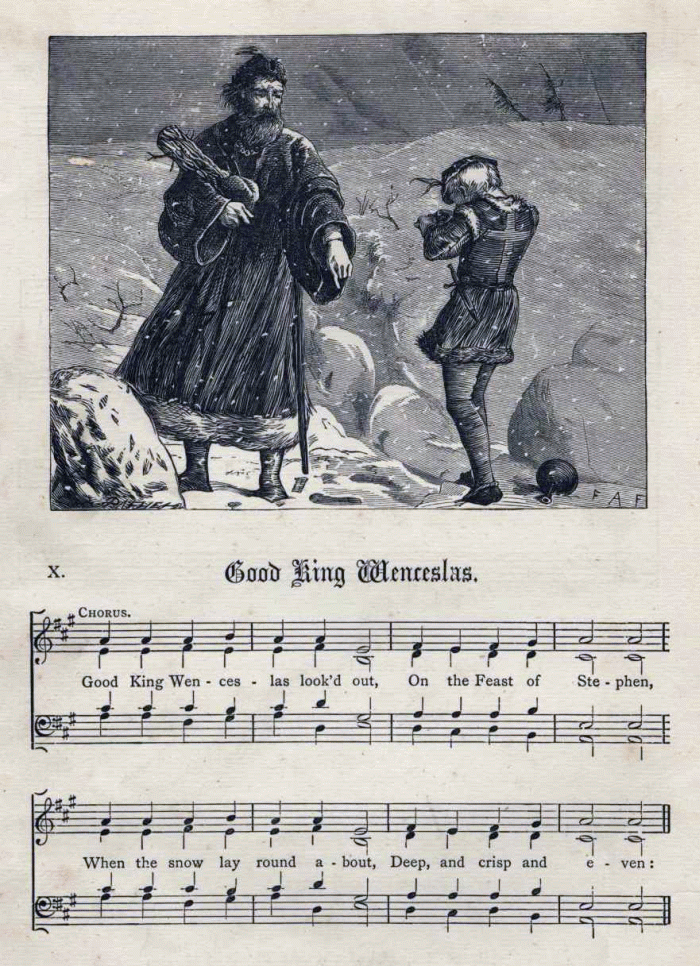By Susanne Dietze
Many of us have heard "Good King Wenceslas," a Christmas carol which tells of a king and his page braving harsh winter weather to assist a peasant on the Feast of Saint Stephen (December 26). But who is King Wenceslas, and how did this song become a beloved holiday carol when it has nothing to do with Christmas?
 |
| Engraving, 1879, Ramsden Bramley. Public Domain. |
Wenceslaus's family had not been Christians for long. His paternal grandparents Bořivoj I of Bohemia and Ludmila converted after learning about Christianity from Saints Cyril and Methodius. Their son, Wenceslaus's father Vratislaus I (c. 888-921), was a Christian but he married his wife, Drahomíra, not for her faith, but to establish ties with the Polabian Slavs, as she was the daughter of the tribal chief. Drahomíra was baptized at the time of their marriage, but does not seem to have been truly converted. Their children Wenceslaus and his brother Boleslav were raised as Christians, however.
 |
| Vratislav I of Bohemia, Liber depictus. Public Domain. |
When Wenceslaus was thirteen years old, in 921, his father died. He was too young to rule alone, so his paternal grandmother Ludmila became his regent--but not for long. Wenceslaus's mother Drahomíra arranged to have Ludmila killed, and the poor queen was said to have been strangled by her own veil in September of 921.
 |
| Ludmila and Drahomíra with young Wenceslaus, 19th-century painting, by Josef Mathauser. Public Domain |
Drahomíra became regent and at once, took action against Christians. Many were killed. Once Wenceslaus turned eighteen, he gathered the remaining Christian nobles and rose against his mother. They were successful in their campaign, and he sent his mother into exile in Budeč.
To prevent fighting between Wenceslaus and his brother Boleslav, the nobles split the country between them. Wenceslaus ruled through a series of military conflicts, and also founded a rotunda devoted to St. Vitus at Prague Castle (now St. Vitus Cathedral).
| Statue of Wenceslaus in St. Vitus Cathedral, Prague. Public Domain |
In 935, however, Boleslav followed his mother's example and determined to kill his political rival, even though it was his own brother. After inviting Wenceslaus to celebrate the Feast of Saint Cosmas together, three of Boleslav's friends, Tira, Česta, and Hněvsa, stabbed Wenceslaus. As the duke fell, Boleslav ran him through with a lance.
Shortly after Wenceslaus' murder, he was viewed as a martyr, killed for his Christian faith. Within twenty years or so, four biographies circulated about Wenceslaus, which included stories of Wenceslaus' noble deeds and compassion. These accounts influenced the High Middle Ages idea of a rex justus, or righteous king, a ruler of piety and courage.
Holy Roman Emperor Otto I (962–973) posthumously conferred the title of king onto Wenceslaus, who was eventually sainted with a Feast Day of September 28 (a national holiday in Czech since 2000).
Wenceslaus has been admired, celebrated, and venerated for more than a thousand years, but the carol we hear during the holidays has only been around since 1853.
 |
| Illustration of Wenceslaus and his page by Arthur Gaskin, 1904. Public Domain. |
English hymnwriter John Mason Neale wrote the lyrics to "Good King Wenceslas" (set to a centuries-old tune), and the song first appeared in Carols for Christmas-Tide, 1853. In the church calendar, Christmas lasts for Twelve Days (Dec 25-January 5) so even though the song has nothing to do with Christmas, per se, it is set on St. Stephen's Day, December 26, which makes it appropriate for Christmastide.
The legend that inspired the song about Wenceslaus may not be true, but the legacy of compassion and generosity is perfect for Christmas and the whole year though. The carol ends:
Therefore, Christian men, be sure, wealth or rank possessing,
Ye who now will bless the poor, shall yourselves find blessing.
***
Susanne Dietze is a 2019 RWA RITA-nominee and author of soon-to-release The Blizzard Bride from Barbour Publishing. She loves to chat with readers and can be found at her website, www.susannedietze.com.



Interesting! Thanks for the post!
ReplyDeleteHi Connie! Thanks! I admit I was curious about just who Wenceslas was, and that's what led to this post.
ReplyDeleteHope you have a wonderful holiday season!
Informative and interesting post about King Wenceslas. Have a blessed Christmas season, Susanne.
ReplyDeleteThank you, Marilyn! I pray your Christmas is blessed, as well.
DeleteWow, I didn't know this information. Thanks for sharing.
ReplyDelete